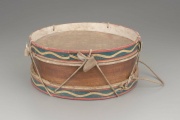Difference between revisions of "Rope"
Jump to navigation
Jump to search
(username removed) |
|||
| (3 intermediate revisions by 2 users not shown) | |||
| Line 1: | Line 1: | ||
| − | [[File:17.2026a-b-SC34132.jpg|thumb| | + | [[File:17.2026a-b-SC34132.jpg|thumb|tabor<br>MFA# 17.2026a-b]] |
== Description == | == Description == | ||
| − | A strong, thick cord made from either natural or synthetic fibers. Ropes are composed of three to six yarns that are plied then twisted or braided. In ancient Egypt, ropes were made from [ | + | A strong, thick cord made from either natural or synthetic fibers. Ropes are composed of three to six yarns that are plied then twisted or braided. In ancient Egypt, ropes were made from [[reed|reeds]] or [[date%20palm|date palm]] fibers. Ancient ropes were also made from [[flax|flax]], [[grass|grass]], [[esparto%20grass|esparto grass]], [[hemp|hemp]], [[sisal|sisal]], [[coir|coir]], [[cotton|cotton]], [[jute|jute]], [[papyrus|papyrus]], and [[camel%20hair|camel hair]]. Up to 1850, most ropes were made from hemp or sisal. After this point, [[abaca|abaca]] and [[agave|agave]] became the fibers of choice. By the 1950s, synthetic fibers ([[nylon%20fiber|nylon]], [[rayon%20fiber|rayon]], [[saran%20fiber|saran]], [[polyester%20fiber|polyester]], etc.) became predominant. [[Glass%20fiber|Glass]] and [[metallic%20fiber|metallic]] fibers have also been incorporated into ropes for added strength and resistance to fire and chemicals. |
== Synonyms and Related Terms == | == Synonyms and Related Terms == | ||
| Line 8: | Line 8: | ||
cord; cable; twine; cuerda (Esp.) | cord; cable; twine; cuerda (Esp.) | ||
| − | == | + | ==Resources and Citations== |
| − | * | + | * G.S.Brady, ''Materials Handbook'', McGraw-Hill Book Co., New York, 1971 Comment: p. 236 |
| − | * | + | * Hoechst Celanese Corporation, ''Dictionary of Fiber & Textile Technology'' (older version called Man-made Fiber and Textile Dictionary, 1965), Hoechst Celanese Corporation, Charlotte NC, 1990 |
| − | * | + | * E.J.LaBarre, ''Dictionary and Encyclopedia of Paper and Paper-making'', Swets & Zeitlinger, Amsterdam, 1969 |
* ''Van Nostrand's Scientific Encyclopedia'', Douglas M. Considine (ed.), Van Nostrand Reinhold, New York, 1976 | * ''Van Nostrand's Scientific Encyclopedia'', Douglas M. Considine (ed.), Van Nostrand Reinhold, New York, 1976 | ||
| − | * | + | * A.Lucas, J.R.Harris, ''Ancient Egyptian Materials and Industries'', Edward Arnold Publishers Ltd., London, 4th edition, 1962 |
* ''The American Heritage Dictionary'' or ''Encarta'', via Microsoft Bookshelf 98, Microsoft Corp., 1998 | * ''The American Heritage Dictionary'' or ''Encarta'', via Microsoft Bookshelf 98, Microsoft Corp., 1998 | ||
Latest revision as of 14:27, 27 June 2022
Description
A strong, thick cord made from either natural or synthetic fibers. Ropes are composed of three to six yarns that are plied then twisted or braided. In ancient Egypt, ropes were made from reeds or Date palm fibers. Ancient ropes were also made from Flax, Grass, Esparto grass, Hemp, Sisal, Coir, Cotton, Jute, Papyrus, and Camel hair. Up to 1850, most ropes were made from hemp or sisal. After this point, Abaca and Agave became the fibers of choice. By the 1950s, synthetic fibers (nylon, rayon, saran, polyester, etc.) became predominant. Glass and metallic fibers have also been incorporated into ropes for added strength and resistance to fire and chemicals.
Synonyms and Related Terms
cord; cable; twine; cuerda (Esp.)
Resources and Citations
- G.S.Brady, Materials Handbook, McGraw-Hill Book Co., New York, 1971 Comment: p. 236
- Hoechst Celanese Corporation, Dictionary of Fiber & Textile Technology (older version called Man-made Fiber and Textile Dictionary, 1965), Hoechst Celanese Corporation, Charlotte NC, 1990
- E.J.LaBarre, Dictionary and Encyclopedia of Paper and Paper-making, Swets & Zeitlinger, Amsterdam, 1969
- Van Nostrand's Scientific Encyclopedia, Douglas M. Considine (ed.), Van Nostrand Reinhold, New York, 1976
- A.Lucas, J.R.Harris, Ancient Egyptian Materials and Industries, Edward Arnold Publishers Ltd., London, 4th edition, 1962
- The American Heritage Dictionary or Encarta, via Microsoft Bookshelf 98, Microsoft Corp., 1998
- Art and Architecture Thesaurus Online, http://www.getty.edu/research/tools/vocabulary/aat/, J. Paul Getty Trust, Los Angeles, 2000
